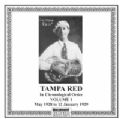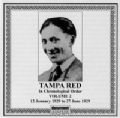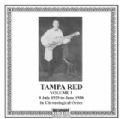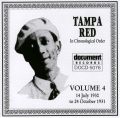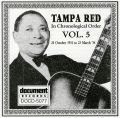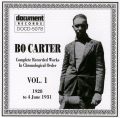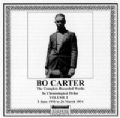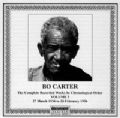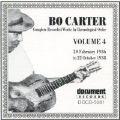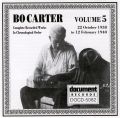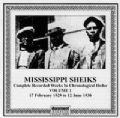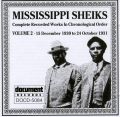"Document 5000 Series "
Viewing 73 to 84 of 700
|
Tampa Red Vol 1 1928 - 1929 Tampa Red, vocal, bottleneck slide guitar With contributions by: “Georgia Tom” (Thomas A. Dorsey) vocal, piano; Forster & Harris, vocal; Madlyn (Red Hot Shakin’) Davis, vocal; Frankie “Half-Pint” Jaxon, vocal; Martell Pettiford, guitar; Herman Brown, kazoo, washboard; Carl Reid, jazzhorn, jug. Genres; Country blues, Pre-war Chicago blues, hokum, blues guitar, blues piano, bottleneck slide guitar. Informative booklet notes by Teddy Doering. From this CDs booklet notes. For the moment, that was it…, one side and no more! The recording was issued as a flip side to Blind Lemon Jefferson “How Long How Long” (Document DOCD-5019) maybe as a ploy to encourage the market to listen to Tampa. After four months Tampa was in the recording studio again but this time only as a session man for Foster And Harris (Ma Rainey’s Boys) as they played out The Alley Crap Game a performance which would be taken up by the two blues brothers from Georgia Robert “Barbecue Bob” Hicks and Charlie “Laughing Charlie” Hicks in 1930 with their “Dark Town Gamblin’ – Part 1 (The Crap Game)” (Document DOCD-5048). Dodging the ricocheting dices, Tampa provides a gentle slide guitar accompaniment and keeps out of the arguing between the two gamblers. Continued... More Info on our New Store >> |
||
|
Tampa Red Vol 2 12th January to 27th June 1929 Tampa Red, vocal, guitar, bottleneck-slide guitar. The Hokum Boys: Tampa Red, vocal, guitar; Georgia Tom Dorsey, piano. Genres: Blues, Blues Guitar, Blues piano, Hokum Blues. Informative booklet notes by Teddy Doering. From this CDs booklet notes. More Info on our New Store >> |
||
|
Tampa Red Vol 3 1929 - 1930 Tampa Red, vocal, bottleneck slide guitar. With contributions by; Jenny Pope, vocal. Genre; blues guitar, blues piano, hokum, bottleneck slide guitar. Informative booklet notes by Teddy Doering. Taken from this album's booklet notes.
More Info on our New Store >> |
||
|
Tampa Red Vol 4 1930 - 1931 Tampa Red, vocal, guitar. Includes recordings by Sweet Papa Tadpole (possibly Walter Coleman) accompanied by Tampa Red on guitar. With contributions by: Georgia Tom Dorsey, piano; Carl Reid, washboard Frankie “Half Pint” Jaxon, vocal. Genres: Blues, Bottleneck-slide Guitar, Hokum Blues, Early Chicago Blues. Informative booklet notes by Teddy Doering. From this CDs booklet notes More Info on our New Store >> |
||
|
Tampa Red Vol 5 1931 - 1934 Tampa Red, vocal, guitar. With contributions by: Georgia Tom (Thomas A. Dorsey), vocal, piano; Black Bob, piano. Genres: Blues, Blues Guitar, Bottleneck-slide Guitar, Blues Piano. Early Chicago Blues. Informative booklet notes by Teddy Doering. From this CD's booklet notes. More Info on our New Store >> |
||
|
Bo Carter Vol 1 1928 - 1931 Bo Chatman (Bo Carter) vocal, guitar. Includes Mary Butler (probably Rosie Mae Moore) vocal. With contributions by: Lonnie Chatmon, violin; Charlie McCoy, mandolin; Walter Vincson, guitar. Genres: Blues, Country Blues, Mississippi Blues, Blues Guitar, String Band. Informative booklet notes. From this album's booklet notes. More Info on our New Store >> |
||
|
Bo Carter Vol 2 5th June 1931 to 26th March 1934 Bo Carter, vocal, guitar.
With contributions by Lonnie Chatman, violin.
Genres: Country Blues, Mississippi Blues, Country Blues Guitar.
Informative booklet notes by Ken Romanowski
Detailed discography.
In the time between his December 1928 New Orleans session and his next solo recording date at the King Edward Hotel in Jackson, Mississippi on December 15, 1930, Bo Carter had participated in numerous sessions in the role of accompanist. There were two sessions in Memphis in late September 1929 and February 1930 where Chatman's Mississippi Hotfooters (with Carter probably on violin) backed both Walter Vincent (Vincson) and Charlie McCoy on several tracks apiece. On these occasions he most likely had contact with some of the other artists who recorded there. Included among their number were some of the more popular and influential Race artists of the period: Jim Jackson, Tampa Red, Georgia Tom, Speckled Red, Furry Lewis, Memphis Minnie, Kansas Joe, Robert Wilkins, Jed Davenport, and Garfield Akers. Continued... More Info on our New Store >> |
||
|
Bo Carter Vol 3: 27 March 1934 to 20 February 1936 Bo Carter, vocal, guitar. With contributions by Harry Chatmon, piano (tracks 13 & 14) Genres; Country Blues, Mississippi Blues, Country Blues Guitar. Informative booklet notes by Ken Romanowski
Detailed discography.
The first Bluebird sessions in March of 1934 marked a return to the studio for Bo after a two and a half year absence. Tastes in blues had changed and the record companies could no longer afford to take chances on untested acts or untried material. A more disciplined approach was applied in the studio and this sometimes led to records that sounded formulaic or unexciting. Bo Carter's records at this time showed as much or more diversity as any of his recording rivals and his regular trips to the studio attested to his popularity. Continued... More Info on our New Store >> |
||
|
Bo Carter Vol 4: 20 February 1936 to 22 October 1938 Bo Carter, vocal guitar. Genres: Country Blues, Mississippi Blues, Country Blues Guitar. Informative booklet notes by Ken Romanowski.
Detailed discography.
It has taken quite some time for Bo Carter's rightful place in blues history to be established. His music was complicated and multifaceted. The question of whether his lyrics are "pornographic" or merely an uninhibited and even healthy view of sexuality is really a relative one. There is certainly enough "raw" data contained in Bo Carter - Vol. 4 for the listener to come to his own conclusion. All Around Man, It's Too Wet, Cigarette Blues, Your Biscuits Are Big Enough For Me, and Don't Mash My Digger So Deep are classics of their type and the gorgeous guitar work on "Cigarette Blues" alone should be enough to persuade even the casual listener that there is more here than suggestive wordplay. Continued... More Info on our New Store >> |
||
|
Bo Carter Vol 5: 22 October 1938 to 12 February 1940 Bo Carter, vocal, guitar.
Genres: Country Blues, Mississipi Blues, Country Blues Guitar.
Informative booklet notes by Ken Romanowski.
Detailed discography.
Bo Carter was still touring the South with the Mississippi Sheiks in the years 1930 through 1935. This activity took the band through Mississippi, Tennessee, Georgia, Louisiana, and as far north as Illinois and New York. During this period Bo's eyesight got progressively worse and he eventually went blind sometime in the 1930s. This ensuing blindness and the disbanding of the Sheiks led Carter to concentrate on his solo recordings. On October 22, 1938 he had his longest session ever, recording eighteen titles in one day, all but one of them issued. This session produced some of his most advanced music from a structural and harmonic standpoint. Continued... More Info on our New Store >> |
||
|
Mississippi Sheiks Vol 1 1930 Mississippi Sheiks.
Includes; Walter Vincson, vocal, guitar; Lonnie Chatman, vocal, violin; Bo Carter, vocal, guitar, violin.
Genres: String band, Country Blues, Mississippi blues.
Informative booklet notes by Chris Smith.
Detailed discography.
From this album's booklet notes:
It wasn't until February 1930 that the Mississippi Sheiks encountered Okeh's field recording unit in Shreveport, Louisiana, some distance from their base in the Jackson, Mississippi area. Their name was made up at the recording session at the request of producer Polk Brockman, and was apparently inspired by the pop hit 'Sheik of Araby', although the word was common in black speech, thanks to Rudolph Valentino. Continued...
More Info on our New Store >> |
||
|
Mississippi Sheiks Vol 2: 17th February to 12th June 1930 Mississippi Sheiks
Includes; Walter Vincson, vocal, guitar; Lonnie Chatman, violin.
Genres: String band, Mississippi blues, Country Blues.
Informative booklet notes by Chris Smith.
Detailed discography.
Taken from this album's booklet notes:
In December 1930 the Sheiks were in Jackson, Mississippi, near to their home, when the Okeh field unit came by. Walter Vinson. Many of the numbers cut in are distinctly lowdown and blue. The Sheiks remade their two hits, Sitting On Top Of The World and Stop And Listen, with new lyrics as powerful as the originals, and Still I'm Travelling On was also closely related to the former title. Times Done Got Hard was about the Depression, and Unhappy Blues has a remarkable lyric about imprisonment. Honey Babe Let The Deal Go Down may have been prompted by a record company request for a version of "Don't Let Your Deal Go Down Blues", by the white, Old-Timey artist Charlie Poole. If so, it's evident that the Sheiks weren't familiar with Poole's song, but they nevertheless produced a fine blues from the given title. She Ain't No Good, with its scurrilous comments on the alleged ways of country girls, is in the lighter vein of hokum, but Vinson was back to blues for the rest of the session. Ramrod Blues mines the Sheiks' rich vein of sexual metaphor, perhaps instigated by Bo, and Church Bell Blues, like Stop and Listen, drew its inspiration from a funeral, a topic to which Vinson returned with a frequency that seems literally morbid, but one which often evoked inspired guitar playing from him. Continued...
More Info on our New Store >> |
||

